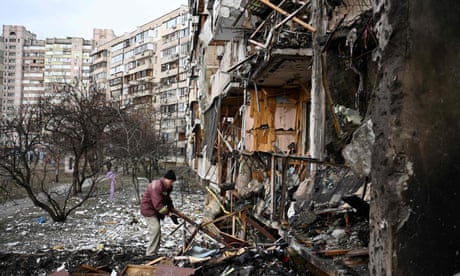- by foxnews
- 08 Apr 2025
‘Pure Orwell’: how Russian state media spins invasion as liberation
‘Pure Orwell’: how Russian state media spins invasion as liberation
- by theguardian
- 26 Feb 2022
- in news

Turn on Russian state television on Friday afternoon and you will see little sign that the country's missiles are pounding the Ukrainian capital.
Instead, the full force of the state propaganda machine has been mobilised to portray Moscow's invasion as a defensive campaign to "liberate" Ukraine, focusing much of its coverage on the alleged protection of the Donbas, supposedly under attack by Kyiv.
"Our situation is very concerning. The enemy is attacking our positions, entering civilian houses," said Leonid Pasechnik, the leader of the self-proclaimed republic in Luhansk, to the Rossiya-24 channel.
A breaking news banner on Channel One said that "Ukraine launched three missiles at the Donetsk People's Republic in the last seven minutes".
The Russian state news mostly follows Vladimir Putin's narrative on the war, which he laid out in his address to the nation early on Thursday morning when he announced a limited "special military operation" to "demilitarise" Ukraine and protect citizens in the Donbas from what he claimed was a Ukrainian "genocide".
Throughout Friday morning, a Russian assault on the Ukrainian capital was often simply denied.
"Kyiv, as a city where civilians live, hasn't been bombed by anyone. There hasn't been any terror there or instructions to cause such terror," said the Channel One pundit Artyom Sheinin on Friday, contradicting the myriad of reports that have shown the opposite.
As it becomes harder for state media to ignore the full-scale invasion into Ukrainian territory, some channels have started to frame Russian soldiers as eagerly anticipated liberators.
"The people in the city Kharkiv only have one issue with the Russian army: 'What took you so long?'" said Olga Skabeyeva, one of the country's most prominent state television hosts.
Coverage of the invasion contrasts steeply with that of other Russian military campaigns. During Russia's 2015 military intervention in Syria, viewers were often treated to flashy videos of fighter jets destroying their targets. The avoidance of such videos this time serves as a sign that Russian authorities are aware of the country's deep unease with the conflict.
Television remains the biggest news source for Russians despite becoming less trusted over the past decade, past polling has found, and 62% of the population say they get their news from television. But polls also show that most people under 40 prefer to get their news online and from social media.
Despite a state crackdown on Russian media, readers can still choose from several independent outlets that have been reporting critically on the country's involvement in the war, including the popular online platform Meduza and the television channel Dozhd - both recently branded as "foreign agents".
Those who can read English are still able to access foreign press, and there are also many popular independent Telegram channels run by journalists turned bloggers.
In contrast to WhatsApp, the widely used encrypted messaging app Telegram allows readers to "follow" users in a similar way to Twitter, which is accessed by only 3% of the population. Alexei Pivovarov, a veteran Russian journalist, runs a channel with almost 500,000 followers, aggregating independent news on the war coming from Russia, Ukraine and the west.
Other channels are more opinionated. Commenting on a recent statement by the Kremlin official Valentina Matviyenko, who defended the invasion by saying it "was is the only option to stop a brotherly war", the Telegram user Stalingulag wrote to his 300,000 followers: "This is pure Orwell, War is Peace, Freedom is Slavery."
Signs are emerging that the Kremlin will try to gain a monopoly on the way Russians perceive events in Ukraine by censoring independent outlets reporting on the war.
On Thursday Russia's media watchdog, Roskomnadzor, demanded that Russian media cite only "official information and data" when covering the conflict. The watchdog vowed to immediately block outlets that did not comply with the order.
In a similar move, Russia previously threatened to block at least 10 news outlets unless they deleted their coverage of video investigations by the jailed Kremlin critic Alexei Navalny into high-level corruption. Most outlets gave in to the demands.
Over at the state broadcaster RT - which has parroted many of the themes on the war that were aired on Russian state television - the first signs have emerged that its staff are uncomfortable with the network's war coverage.
At least one English-language RT staff member and one frequent RT contributor in Moscow have quit the network in recent days over the editorial position on the war, the Guardian has learned.
"In light of recent events, earlier today I resigned from RT with immediate effect," the former RT staff news writer in Moscow Jonny Tickle tweeted on Thursday.
The frequent RT contributor who resigned said, on condition of anonymity, that there had "been an exodus of staff already" at the channel.
"Several people already quit - and lots more said to be contemplating."
- by foxnews
- descember 09, 2016
Ancient settlement reveals remains of 1,800-year-old dog, baffling experts: 'Preserved quite well'
Archaeologists have recently unearthed the remarkably well-preserved remains of a dog from ancient Rome, shedding light on the widespread practice of ritual sacrifice in antiquity.
read more


